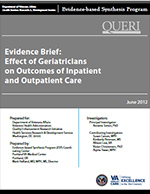
|
Investigators: Evidence-based Synthesis Program (ESP) Center, Portland VA Medical Center Washington (DC): Department of Veterans Affairs; June 2012 |
Download: Report (662 KB, PDF), Supplemental Materials (334 KB, PDF)
In 2011, 42.1 percent (approximately 9 million) of all US Veterans were over 65 years old. An increasing number of these older Veterans are receiving health care from the Veterans Healthcare Administration (VHA). Projections are that 43 percent of all Veterans over 65 will enroll in VHA in 2013, up from 31 percent in 2003; 20 percent of Veterans over 85 received care in VHA in 2003, and this is expected to rise to 51 percent by 2013.
As Veterans age, their health care needs are likely to change and increase, resulting from the development of chronic illness and age-related disability. Geriatric syndromes, such as falls and incontinence, can contribute to acute or serious problems such as fractures and pressure ulcers. Cognitive impairments, regardless of the cause, make managing both daily life and chronic conditions such as diabetes challenging. Additionally, older Veterans are more likely to take multiple medications and receive health care from several clinicians. This increases the chances for adverse drug events, miscommunication, and fragmented care that can ultimately result in negative consequences for older Veterans. Multifaceted and multidisciplinary models of care for older people have been developed, such as Comprehensive Geriatric Assessment (CGA) and Geriatric Evaluation and Management (GEM). The common elements of these models are assessment and follow-up with a focus on maximizing function and quality of life while avoiding negative outcomes to the extent possible.
Addressing the needs of older Veterans requires a combination of different models of care and the involvement of health care providers with expertise in caring for older people. Geriatricians are physicians with additional training and certification in the care of the multiple and often complex health concerns of older adults. Geriatricians can play different roles in care teams; and in these care models, their roles may range from leader of a team, to occasional consultant, to clinician with primary responsibility for care.
This evidence brief summarizes the existing research available on the impact of geriatricians, acting in various roles, on selected patient outcomes in hospital and outpatient care.
The following key questions were addressed:
Key Question #1A: What is the effectiveness of geriatric teams, consultative services or geriatric co-management for inpatient medical and surgical patients?
Key Question #1B: If increased effectiveness is demonstrated, are there specific characteristics (either of the patient or the care model) that lead to improved outcomes for inpatients?
Key Question #2A: What is the effectiveness of geriatric consultation, co-management, or geriatricians as primary care providers for outpatient primary care?
Key Question #2B: If geriatric care is shown to lead to improved outcomes, are there specific characteristics (either of the patient or care model) that lead to more effective outcomes among the primary care outpatient population?